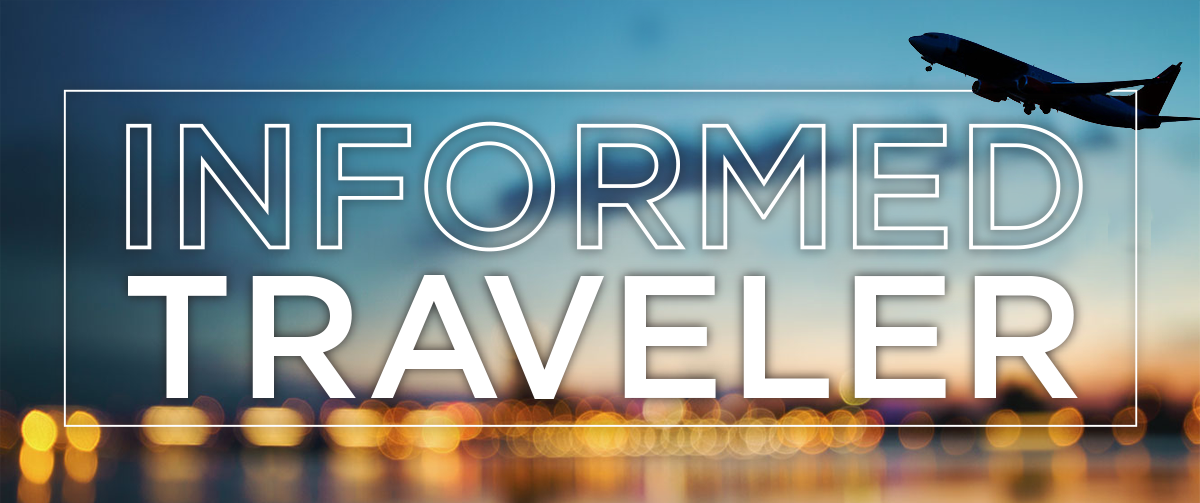Amex GBT Lawyers Travel's (Lawyers Travel™) weekly client e-newsletter, the Informed Traveler, keeps readers updated on travel industry news and trends.
Following is a recap of August's top 5 (most clicked by Lawyers Travel's clients) e-newsletter stories.
1. ATLANTA HARTSFIELD-JACKSON AIRPORT TO OPEN PRIVATE, LUXURY TERMINAL IN SEPTEMBER
Atlanta's Hartsfield-Jackson International Airport (ATL) will open a new private terminal in September, offering convenience and luxury for travelers to fly commercially without entering the airport, reports CNN. The development of the terminal comes through a partnership with PS, a company that provides private luxury terminal service for commercial flights. It’s the second terminal PS has developed for an airport in the US, with a similar private terminal having been open at Los Angeles International Airport (LAX) since 2017. According to PS, the terminal will feature private TSA screening, along with onsite customs and immigration processing. A PS host will also take care of all luggage, and travelers will be escorted to their flight by a private driver. Amenities in the terminal include an extensive menu of cocktails, chef-prepared meals, as well as spa and beauty offerings such as massages, manicures, and barber services. The company said the experience is reminiscent of a private members club and is perfect for getting work done, conversing, or relaxing. A non-membership experience costs $1,095, while the annual fee for an all-access membership is $4,850. PS plans to add more private terminals at Dallas-Fort Worth (DFW) in spring 2024 and Miami International Airport (MIA) in 2025.
2. BUSINESS TRAVEL FOR 2024 IS ON TRACK TO EXCEED PRE-PANDEMIC LEVELS
A new report from the Global Business Travel Association (GBTA) is projecting that business travel will surpass 2019 levels of travel in 2024, two years sooner than GBTA had previously predicted, reports Travel Pulse. Having “rebounded at a more accelerated rate than expected just a year ago,” business travel spend is expected to approach $1.4 trillion in 2024. By 2027, that figure will approach $1.8 trillion. GBTA's report attributes the quick rebound in business travel to pent-up demand, favorable economic conditions worldwide, and receding fears about a recession. "The headwinds that were anticipated to impact the rebound of global business travel over the past year didn’t materialize and that is good news,” said GBTA CEO Suzanne Neufang. “This latest forecast now indicates an accelerated return to pre-pandemic spending levels sooner than anticipated as well as growth ahead in the coming years. Business travel spending is a key indicator, but how travel volumes will continue to rebound is yet to be seen.”
3. US, CHINA AGREE TO DOUBLE WEEKLY FLIGHTS BETWEEN COUNTRIES
The US and China will approve twice the number of flights currently permitted for air carriers to fly between the two countries under a new agreement, reports Reuters. The Transportation Department (DOT) said it would increase the number of Chinese passenger flights allowed to fly to the US to 18 weekly roundtrips on September 1 and increase that to 24 per week starting October 29. Currently, there are only 12 weekly round-trip flights to China. The Chinese government will agree to the same increase for American carriers. "Our overriding goal is an improved environment wherein the carriers of both parties are able to exercise fully their bilateral rights to maintain a competitive balance and fair and equal opportunity among US and Chinese air carriers," DOT assistant secretary of aviation and international affairs Carol Petsonk said. The agreement comes after China lifted travel restrictions on group tours for more countries, including key markets such as the US, Australia, Japan, and South Korea. Airlines for America (A4A) said it “supports the gradual reopening of US-China air services commiserate with increases in passenger demand over time. Today’s modified Order ensures fair and equal opportunity for US airlines to compete in the marketplace.” The 24 weekly flights are still a fraction of the more than 150 round-trip flights allowed by each side before restrictions were imposed in early 2020 due to COVID-19.
4. US AIRLINES SEEK EXTENSIONS TO NEW YORK FLIGHT CUTS
Major US airlines have asked the Federal Aviation Administration (FAA) to extend cuts to minimum flight requirements at New York City-area airports as well as Ronald Reagan Washington National Airport (DCA), citing a lack of adequate air traffic control staffing, reports Reuters. In March, the FAA agreed to the request of Delta and United to temporarily return up to 10% of slots and flights at New York-area airports and DCA through September 15. Recently, Airlines for America (A4A), a trade group representing major carriers, asked that the cuts be extended through October 28, saying air traffic staffing levels in a key northeastern sector have not "meaningfully improved." A4A said air traffic control staffing and extreme weather "are unique circumstances beyond our control." The group added, "Granting relief for the rest of the summer season is in the best interest of the flying public because it will minimize disruptions and provide greater predictability for airlines and consumers." Airlines can lose their slots at congested airports if they do not use them at least 80% of the time. The FAA said earlier this week that it was "in the final stages of review and will decide soon."
5. US SENATE INTRODUCES BILL TO ELIMINATE HOTEL RESORT FEES
Two US Senators have introduced a bill designed to force hotels and resorts to be more transparent about fees, reports NBC News. The bill, called the Hotel Fees Transparency Act, would establish federal guidelines for pricing transparency. The legislation would require anyone advertising a hotel room or a short-term rental to clearly state upfront the final price a traveler would pay to book lodging. It would make the Federal Trade Commission (FTC) responsible for pursuing violations, and it says state attorneys general could also bring civil action for violations. “Too often, Americans making reservations online are being met with hidden fees that make it difficult to compare prices and understand the true cost of an overnight stay,” said Sen. Amy Klobuchar, D-Minnesota, who is introducing the bill with Sen. Jerry Moran, R-Kansas. “This bipartisan legislation would help improve transparency so that travelers can make informed decisions.” Consumer Reports estimated that the hotel industry brought in $2.9 billion in resort fees in 2018. As a result, the Biden Administration announced that they would target junk fees in various industries, including hotels and resorts.



